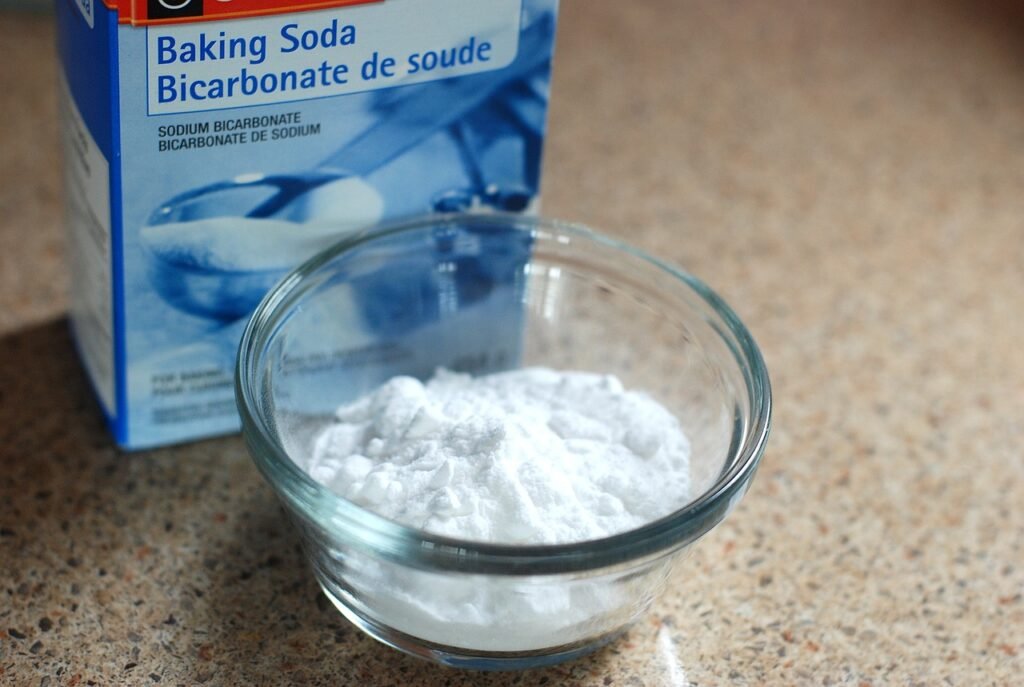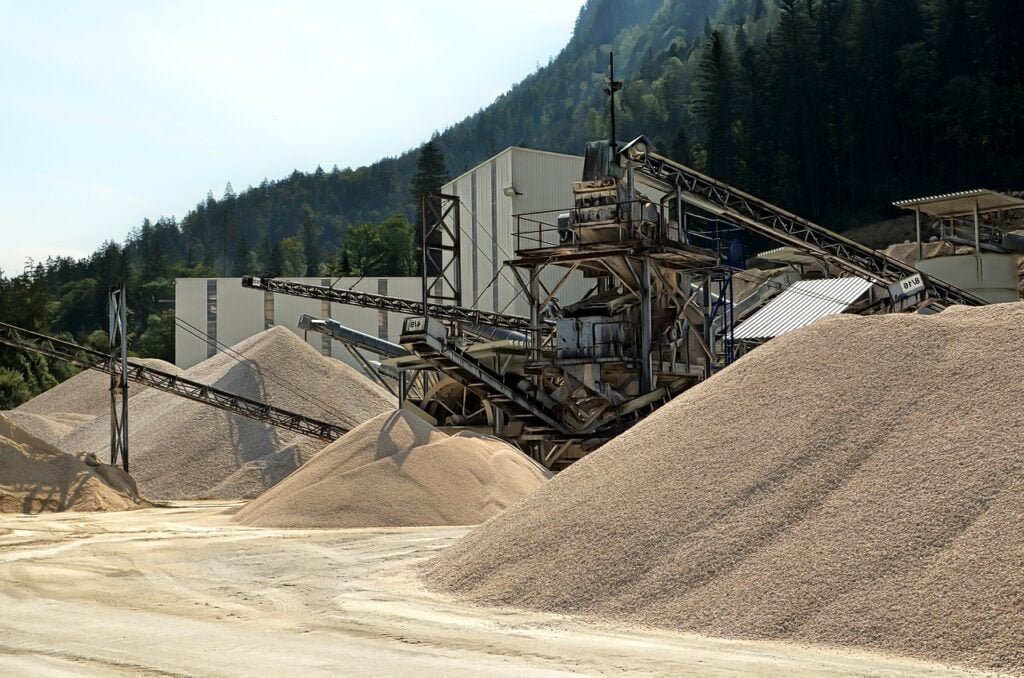Unveiling The Versatile Uses Of Baking Soda: Benefits, Health Impacts, And Surprising Applications

Are you looking for natural and affordable solutions for cleaning, health, and more? Baking soda is more than just a baking ingredient. This versatile powder can improve your home, health, and garden in ways you might not expect.
Our article will guide you through these surprising uses and benefits. Get ready to be amazed!
Key Takeaways:
- Baking soda, also known as sodium bicarbonate, comes from nahcolite and has a neutral pH level which makes it great for baking, cleaning, and health remedies.
- You can use baking soda in the garden to repel pests and act as a natural fungicide, in personal care as a mouthwash or teeth whitener, and around the house as an odor neutralizer or cleaning agent.
- It offers health benefits such as relieving heartburn by neutralizing stomach acid but should be used with caution to avoid metabolic alkalosis.
- Baking soda enhances exercise performance by buffering lactic acid buildup in muscles during workouts.
- As a household item, it serves as an eco – friendly alternative for fire extinguishing and acts as a mild disinfectant.
Understanding Baking Soda: From Origins to Composition

Baking soda, known scientifically as sodium bicarbonate, emerges from a simple but fascinating process. It starts with nahcolite, a natural mineralfound in vast trona deposits. Manufacturers then treat this mineral with carbon dioxide and water to produce the white, powdery substance we recognize as baking soda.
This transformation hinges on careful combinations of elements that yield both its neutral pH level and its versatile applications in baking, cleaning, and health remedies.
Its composition holds the key to why baking soda interacts effectively with acids like vinegar or lemon juice, sparking those vigorous reactions cherished in science class volcanoes and homemade cleaners alike.
These interactions are not just fun showcases of chemistry; they form the backbone of countless practical uses around the home. From deodorizing fridges to soothing heartburn or even acting as a mild disinfectant when mixed correctly, understanding the origins and makeup of baking soda unlocks a treasure trove of organic lifestyle hacks that cater to healthier living spaces without relying heavily on harsh chemicals.
Household Uses of Baking Soda

Baking soda serves as a powerhouse in households, tackling tasks from cleaning to deodorizing with ease. People value its versatility for various applications around the home, showcasing its effectiveness beyond just baking needs.
Gardening Application
Using baking soda in your garden helps repel pests such as aphids, spider mites, and cabbage worms. This simple solution can be a game-changer for those aiming to keep their gardens organic and free from harmful chemicals.
By simply sprinkling baking soda on the soil or plants, you create an environment that is less inviting to these unwanted guests.
Baking soda also plays a crucial role in promoting plant health. It raises the soil’s pH level, making it less acidic which is beneficial for many plants. Applying this versatile compound around your garden acts as a natural fungicide, preventing fungal diseases before they start.
Gardeners appreciate its effectiveness in preventing mold and mildew growth on plants, ensuring they remain healthy and thrive throughout the season.
Mouthwash and Teeth Whitener
Shifting our focus from the garden to personal care, baking soda emerges as a remarkable agent for oral hygiene too. This common kitchen ingredient doubles as an effective mouthwash.
Its natural antibacterial properties help freshen breath by neutralizing bad odors, making it a go-to solution for those seeking a simple and organic alternative.
For individuals aiming to brighten their smile without harsh chemicals, baking soda proves beneficial once again. Studies have shown that toothpaste containing baking soda is superior in whitening teeth and removing plaque.
The abrasive nature of baking soda gently polishes away surface stains, contributing to a whiter, more radiant smile over time, ensuring its role as a vital component in homemade and natural teeth whitening products.

Deodorant and Air Freshener
Baking soda serves as a powerful natural deodorant, effectively neutralizing sweat odors without the chemicals found in traditional products. By making odors less acidic, it offers a straightforward solution for those seeking an organic lifestyle.
Mixing baking soda with water creates a simple paste that can be applied to underarms, providing odor control throughout the day.
For air freshening solutions free from artificial scents and harmful substances, baking soda also excels. Adding essential oils to a jar of baking soda produces a customizable air freshener that can imbue any room with pleasant aromas naturally.
This method not only purifies the air but also aligns with eco-friendly practices by utilizing non-toxic ingredients.
Next, discover how this versatile compound tackles fridge and garbage odors.
Fridge and Garbage Odor Neutralizer
Placing a box of baking soda in the refrigerator can work wonders for eliminating unwanted smells. This simple act ensures that odor particles are neutralized, rather than just covered up, keeping your fridge smelling fresh.
For those dealing with persistent garbage odors, spreading baking soda at the bottom of waste bins can significantly reduce the smell by targeting acidic odor molecules. This method has been proven to decrease garbage odor by as much as 70%, showcasing its effectiveness.
Incorporating baking soda into routine kitchen cleaning can also serve multiple purposes beyond just odor control. It acts as an eco-friendly solution for maintaining cleanliness and hygiene without relying on harsh chemicals.
This aligns well with a natural, organic lifestyle, contributing not only to a cleaner home environment but also to environmental sustainability.
Laundry Whitening Agent
Moving from freshening up your fridge and neutralizing garbage odors, baking soda shines equally in the laundry room. This versatile substance takes on a new role as an effective laundry whitening agent.
Adding it to your regular washing cycle alongside detergent works wonders by removing tough stains and brightening white fabrics without using harsh chemicals.
Baking soda’s natural abrasive qualities gently scrub away stubborn stains, while its alkaline nature helps dissolve dirt and grease effectively. The result is cleaner, fresher-smelling clothes that retain their color and integrity wash after wash.
For those embracing a more natural, organic lifestyle, incorporating baking soda into your laundry routine offers a simple yet powerful way to keep your linens sparkling clean.

Kitchen and Bathroom Cleaner
Transitioning from enhancing the whiteness of your laundry, baking soda also shines as an effective kitchen and bathroom cleaner. This versatile substance tackles dirt and grime on various surfaces when mixed with water or vinegar, making it a must-have for those passionate about a natural, organic lifestyle.
Creating a paste from baking soda allows for easy scrubbing of tiles, sinks, and bathtubs without leaving any harmful chemical residue.
For tougher stains in the kitchen or lime scale build-up in the bathroom, adding lemon juice or vinegar to baking soda boosts its cleaning power. This mixture can effortlessly clean countertops, stainless steel appliances, shower walls, and ceramic toilets by breaking down grease and soap scum.
Rinse everything with water after scrubbing to reveal gleaming surfaces that reflect your commitment to eco-friendly living practices.
Pesticide Remover for Fruits and Vegetables
Baking soda serves as an effective pesticide remover for fruits and vegetables. Simply soaking them in a solution of baking soda and water for about 12-15 minutes can remove nearly all pesticide residue.
This method not only ensures that your produce is cleaner but also supports a healthier lifestyle by reducing the intake of potentially harmful chemicals.
Cleaning fruit with baking soda is easy, affordable, and does not require any special tools or ingredients beyond what you likely already have in your kitchen. This process aligns well with the goals of those pursuing natural and organic living, providing peace of mind about the cleanliness of their food without compromising on safety or effectiveness.
Silverware Polisher
Tarnished silverware no longer needs to stress you out. You can bring back its shine using just baking soda. This natural cleaner acts as an effective polish that removes tarnish without the need for harsh chemicals.
To use, create a paste with three parts baking soda and one part water, then apply it gently to your silver items using a soft cloth. After polishing, rinse the items under warm water and dry them thoroughly to see them sparkle like new.
This method not only cleans but also preserves the quality of your silverware, making it safe for those leading organic lifestyles who prefer non-toxic cleaning solutions. With regular use, baking soda keeps your silver shining bright and prevents future tarnishment from taking hold, ensuring that your kitchen treasures maintain their beauty over time.
Oil and Grease Fire Extinguisher
Baking soda serves as an effective fire extinguisher for small oil and grease fires in the kitchen. This common household item creates carbon dioxide when heated, which smothers the flames safely without spreading the fire further.
Simply sprinkle a generous amount of baking soda directly on the fire to quench it quickly and prevent damage or injury.
Handling a grease fire requires quick thinking and proper materials—water can make such fires worse by spreading flaming oil around. Baking soda becomes a hero in these situations, offering a simple yet powerful solution that many people already have within reach in their kitchens.
Keep it handy not just for cooking but also as a practical safety tool against common kitchen hazards.
Homemade Weed Killer
Creating a homemade weed killer with baking soda presents an eco-friendly and cost-effective option for gardeners and homeowners alike. This natural solution can control weeds effectively without the use of harmful chemicals, making it safe for both the environment and your family.
Applied directly to the weeds in driveways, sidewalks, and garden beds, baking soda targets unwanted growth specifically while sparing surrounding plants.
This method stands out as an efficient way to prevent weed proliferation in various settings around your home. Thanks to its ability to act without damaging nearby flora, using baking soda for this purpose aligns perfectly with a natural, organic lifestyle.
Garden enthusiasts seeking sustainable gardening practices will find baking soda an invaluable ally against weeds.
Shoe Deodorizer
Baking soda proves its versatility once again as a natural solution for getting rid of unpleasant odors in shoes. Place 2 tablespoons of baking soda into cheesecloths or similar thin fabric, secure it, and then tuck these packets into each shoe.
This simple step helps absorb the moisture and neutralizes the bad smell effectively, leaving your footwear fresh for the next wear.
This method not only tackles the issue of smelly shoes but does so without using harsh chemicals found in many commercial deodorizers. It’s a perfect match for individuals passionate about maintaining a natural, organic lifestyle while ensuring their living spaces and belongings remain free from unwanted scents.
Health Benefits of Baking Soda
Baking soda offers a range of health benefits that may surprise you. From easing discomfort to boosting physical performance, this common household item plays a critical role in well-being and health maintenance.
Treating Heartburn
Many people turn to baking soda for heartburn relief. This common household item can neutralize stomach acid quickly, providing temporary relief from the burning sensation that characterizes heartburn and acid reflux.
Dissolving a small amount of baking soda in water and drinking it helps soothe the discomfort associated with these conditions. Its effectiveness comes from its basic nature, which counteracts the excess acidity in the stomach.
However, this method should be used cautiously and not become a regular practice. Frequent use of baking soda as a remedy for heartburn can lead to metabolic alkalosis, a condition where the body’s pH balance is shifted too far towards alkaline.
In extreme cases, this imbalance might contribute to heart problems among other health issues. It underscores the importance of moderation and consulting healthcare providers when considering home remedies like baking soda for managing health conditions such as acid reflux or heartburn.
Soothing Canker Sores
Baking soda stands out as a natural remedy for canker sores, offering relief and promoting healing. Mixing it with water to create a mouthwash not only alleviates pain but also cleanses the affected area.
Its potential antibacterial properties play a crucial role in minimizing the discomfort caused by these sores and speeding up the recovery process.
People looking for an organic solution to treat canker sores find baking soda to be an effective option. This simple yet powerful ingredient reduces inflammation and battles bacteria, making it easier to manage oral health issues like canker sores at home.
With just a bit of water and baking soda, you can create a soothing rinse that aids in healing without resorting to harsh chemicals.
Improving Exercise Performance
Research indicates that sodium bicarbonate, commonly known as baking soda, can play a critical role in enhancing exercise performance. This is due to its effects on muscular strength and endurance.
Athletes and fitness enthusiasts may find that incorporating this substance into their regimen boosts their capacity for intense physical activities by buffering lactic acid buildup in muscles, thereby delaying fatigue and improving overall performance.
Studies highlight the potential benefits of sodium bicarbonate supplementation for individuals looking to push their physical boundaries. Those practicing natural and organic lifestyles might consider this approach as a way to enhance their athletic achievements without resorting to synthetic aids.
As we explore more health advantages of baking soda, the next focus will be on how it provides relief from itchy skin and sunburns.

Relieving Itchy Skin and Sunburns
After exploring how baking soda can boost exercise performance, let’s shift our focus to its soothing benefits for the skin. Baking soda is a versatile remedy that can relieve itchy skin following insect bites or bee stings.
Its alkaline nature provides immediate relief by neutralizing the acidic substances causing irritation. For those suffering from sunburns, adding baking soda to bathwater offers a comforting solution.
The gentle properties of this substance help calm inflamed skin and reduce discomfort.
Applying a paste made from baking soda and water directly to affected areas also soothes itchiness and accelerates healing. This simple yet effective approach addresses skin irritations without the need for harsh chemicals, aligning perfectly with an organic lifestyle.
Whether facing minor sun damage or dealing with irritating bug bites, turning to baking soda as a natural remedy can lead to rapid and noticeable improvement in your skin’s condition.
Surprising Applications of Baking Soda

Baking soda steps beyond the kitchen, showcasing its power in areas from fire safety to agriculture. Explore how this humble ingredient can do much more than just bake.
Mild Disinfectant
For those embracing a natural and organic lifestyle, utilizing baking soda as a mild disinfectant presents an effective way to clean and sanitize surfaces without resorting to harsh chemicals.
Its antibacterial properties help in killing germs and bacteria, making it suitable for deodorizing and cleaning kitchen counters, bathroom surfaces, and even children’s toys. This simple compound neutralizes odors not only in the fridge but also across various areas of the home, proving its versatility beyond just food storage.
Using baking soda for cleaning aligns with sustainable living practices by reducing dependency on commercial products packed with synthetic ingredients. It offers a safe alternative that is easily accessible and cost-effective for maintaining hygiene around the house.
As we explore further applications of baking soda beyond its disinfectant properties, discovering its role as a fire extinguisher opens up new dimensions of household safety measures achievable through this multipurpose substance.
Fire Extinguisher
Baking soda plays a critical role in enhancing safety through its use in fire extinguishers. As an effective suppression agent, it quickly smothers flames, making it indispensable in emergency situations where oil and grease fires might erupt.
This natural compound breaks down under heat, producing carbon dioxide that helps to cut off the oxygen supply to the fire, effectively putting it out.
People seeking eco-friendly alternatives will appreciate that baking soda serves as a safe and readily available solution for combating fires at home or in gardens without resorting to harsh chemicals.
Its versatility extends beyond cooking and cleaning, underscoring its value not just as a household staple but also as a vital component in ensuring safety against potential fire hazards.
Neutralization of Acids
Baking soda shows its power by neutralizing acids, making it a versatile ally in the kitchen and beyond. Combining it with an acid like vinegar or lemon juice triggers a chemical reaction that produces water and carbon dioxide gas.
This reaction not only helps to clean various surfaces effectively but also controls the growth of harmful microorganisms. Such interactions are fundamental in organic cleaning practices, aligning closely with natural lifestyles.
In gardening, this quality can be particularly useful. When soil becomes too acidic for plants to thrive, sprinkling baking soda lightly can help adjust the pH balance towards neutrality.
This simple act supports healthier plant growth without resorting to harsh chemicals, embodying the essence of an organic gardening approach.
Sports Supplement
Moving beyond its use in neutralizing acids, baking soda also finds a unique role as a sports supplement. Many athletes and fitness enthusiasts embrace this common household item to boost their exercise performance.
The science behind it is simple yet fascinating; baking soda can help reduce the acidity produced in muscles during intense workouts. This action delays fatigue, allowing individuals to push harder and longer during their training sessions.
Incorporating baking soda into an athlete’s regimen could be as straightforward as mixing it with water for a pre-workout drink. Studies suggest that this approach might particularly benefit activities involving high-intensity intervals or sustained endurance efforts.
It’s a natural, cost-effective strategy for those looking to enhance their physical performance without resorting to artificial supplements or expensive products. As always, moderation is key, and consulting with a healthcare professional before starting any new supplement routine is wise.

Agriculture
In the realm of agriculture, baking soda finds its usefulness extending far beyond the kitchen. Farmers use it to reduce the risk of ruminal acidosis in cattle, a condition that can impede their health and growth.
This simple compound helps maintain a neutral pH within the stomachs of cows, ensuring they digest their feed more efficiently and stay healthier.
Furthermore, gardening enthusiasts incorporate baking soda into their organic routines for its mild disinfectant properties. It tackles fungal diseases and gently aids in managing insect pests without resorting to harsh chemicals.
Such practices align well with a natural, organic lifestyle, promoting healthier plants and environments.
Next up is an exploration of the potential health risks and side effects associated with excessive or improper use of baking soda.
Health Risks and Side Effects of Baking Soda
Using baking soda for heartburn and acid reflux might seem like a quick fix, but it can lead to serious health issues. Frequent use could cause metabolic alkalosis, a condition where the body’s pH balance shifts too much toward the alkaline side.
This imbalance can trigger heart problems and other unwanted effects. People searching for relief from digestive discomfort should consider these risks before turning to baking soda as a remedy.
Handling baking soda with care is crucial, especially when using it daily in various home remedies or cleaning tasks. While it’s celebrated for its versatility ranging from gardening aids to kitchen cleaners, improper or excessive use poses dangers.
Skin irritation or more severe reactions could occur if used without proper knowledge of its concentration and potential interactions with other substances in your environment. Awareness and caution are key in harnessing the benefits of baking soda while minimizing risks to your health and safety.
Baking Soda Uses Wrap Up
Exploring the vast applications of baking soda reveals its incredible versatility, from enhancing health to simplifying household chores. This natural compound proves time and again that it offers more than just a rise in your baked goods.
Its ability to improve exercise performance, brighten teeth, and even act as a fire extinguisher showcases the wide range of benefits tucked within this common kitchen ingredient. As we uncover these surprising uses and significant health impacts, baking soda stands out as an invaluable asset in daily life, illustrating that sometimes the most effective solutions are already within our reach.
Frequently Asked Questions
Baking soda is a single ingredient, sodium bicarbonate, that helps dough rise when mixed with an acid. Baking powder contains baking soda plus an acidic component and a drying agent, making it ready to use without adding any other acidic ingredients.
Yes, you can use baking powder instead of baking soda; however, you’ll need about three times the amount of baking powder to achieve the same level of rising. Keep in mind this might affect the taste slightly.
Brushing teeth with a paste made from baking soda and water can help remove surface stains on your teeth, leading to a whiter appearance over time due to its mild abrasive properties.
Drinking a small amount of diluted baking soda (sodium bicarbonate) can neutralize stomach acid and ease indigestion or heartburn for some people. However, consuming too much can be harmful, so it’s crucial not to exceed recommended amounts.
Combining vinegar and baking soda creates a chemical reaction that produces carbon dioxide gas and water which can be used for cleaning drains or removing tough stains due to their combined effervescence power.
Yes! Placing an open box of Arm & Hammer™ Baking Soda in your refrigerator helps neutralize odors by absorbing them rather than just masking smells, keeping your fridge smelling fresh longer.



